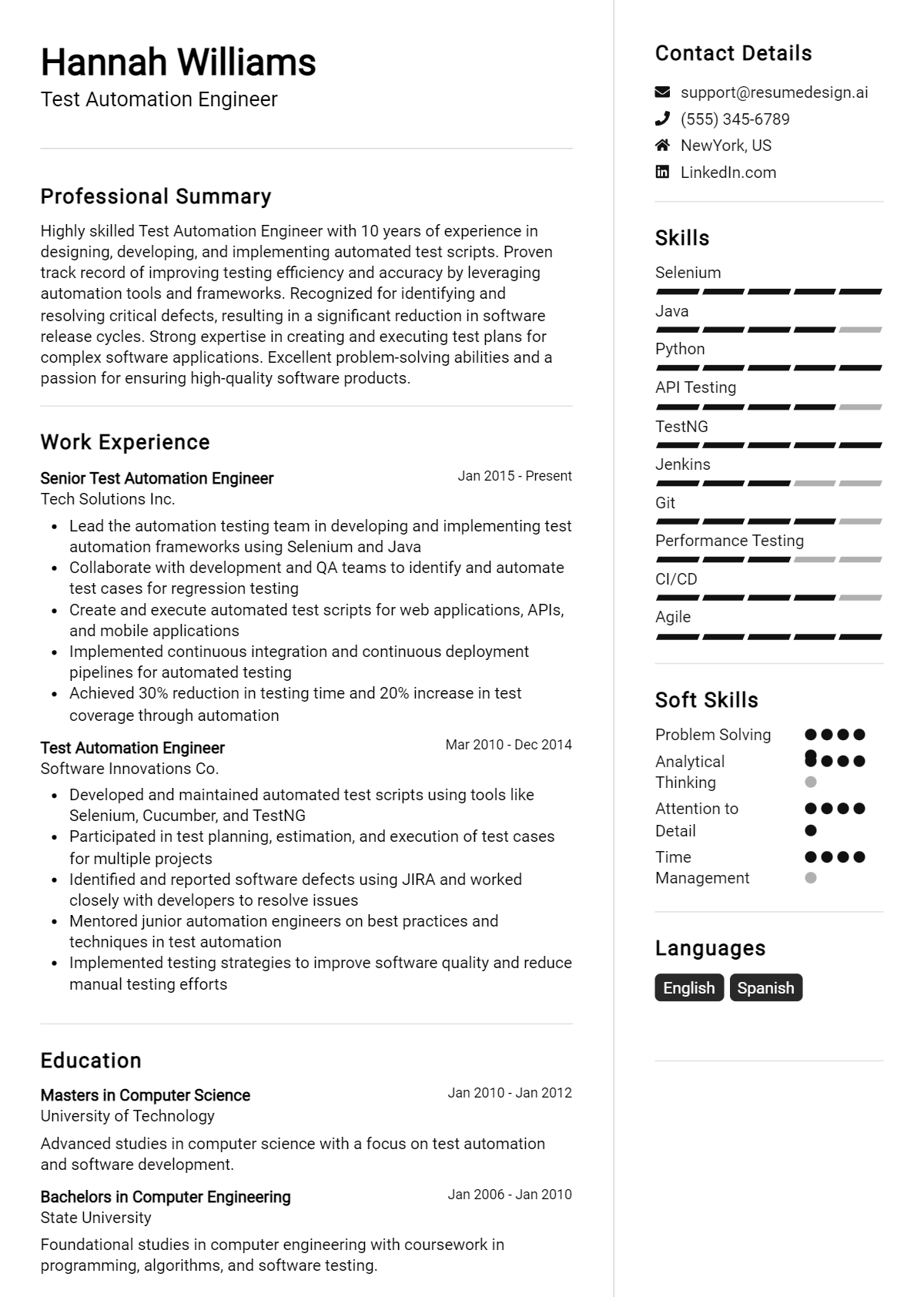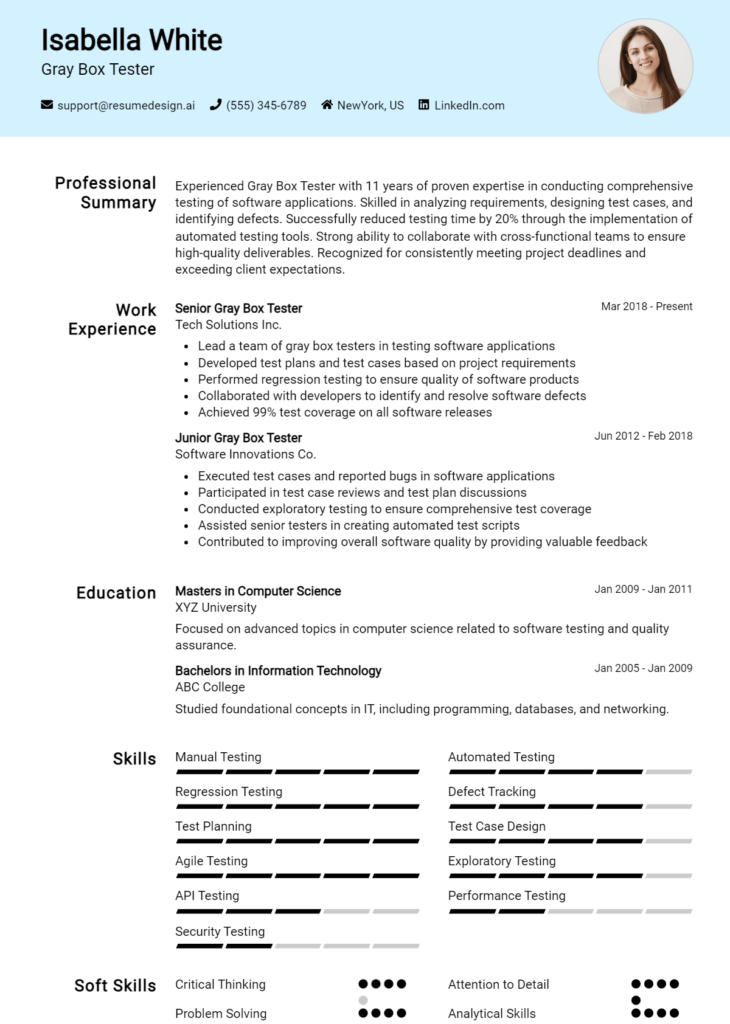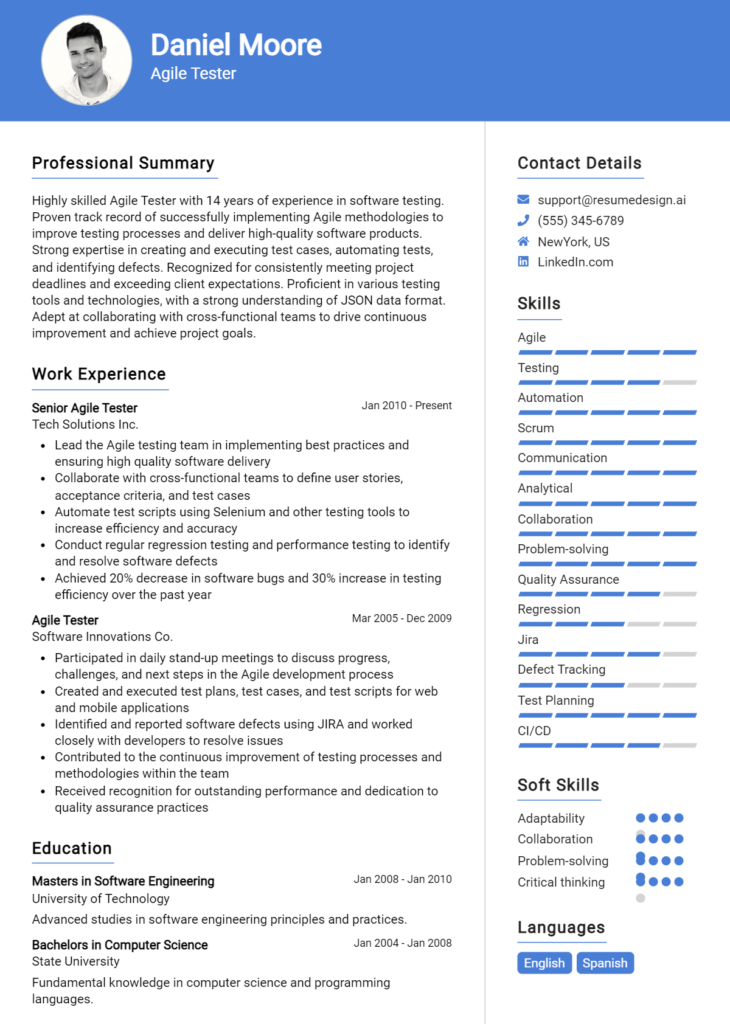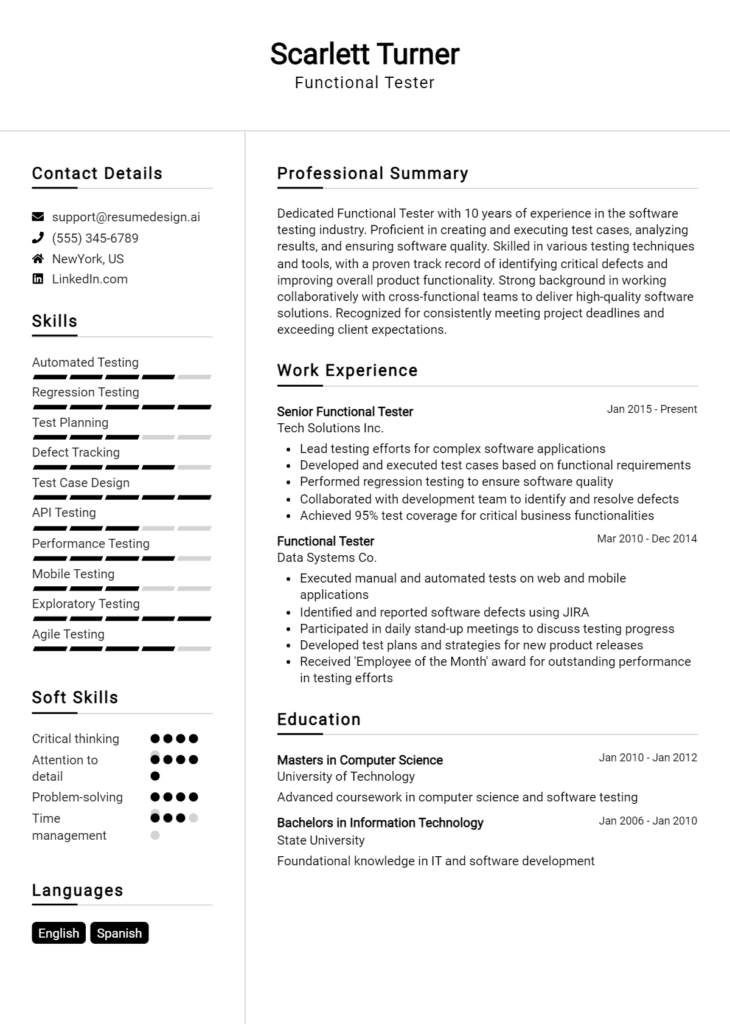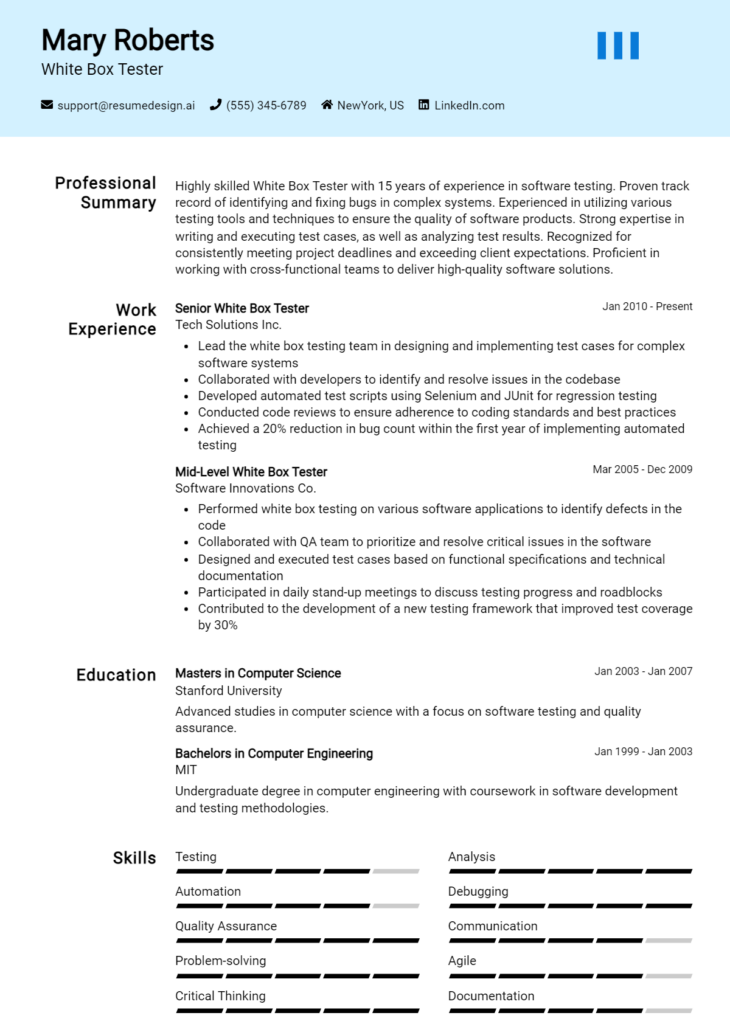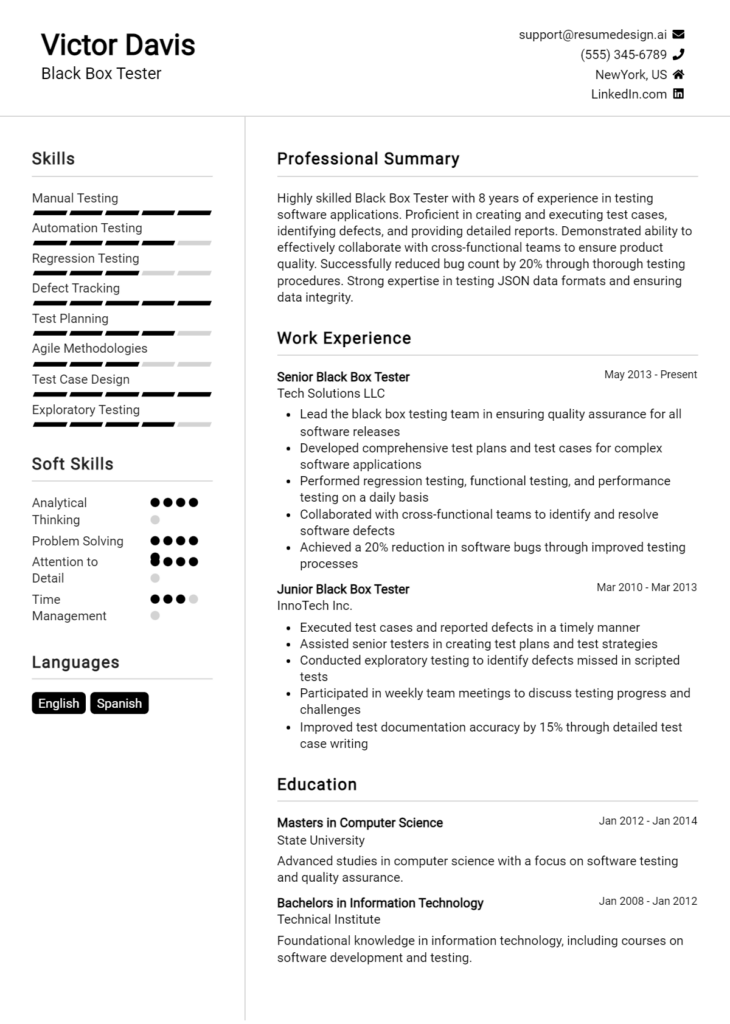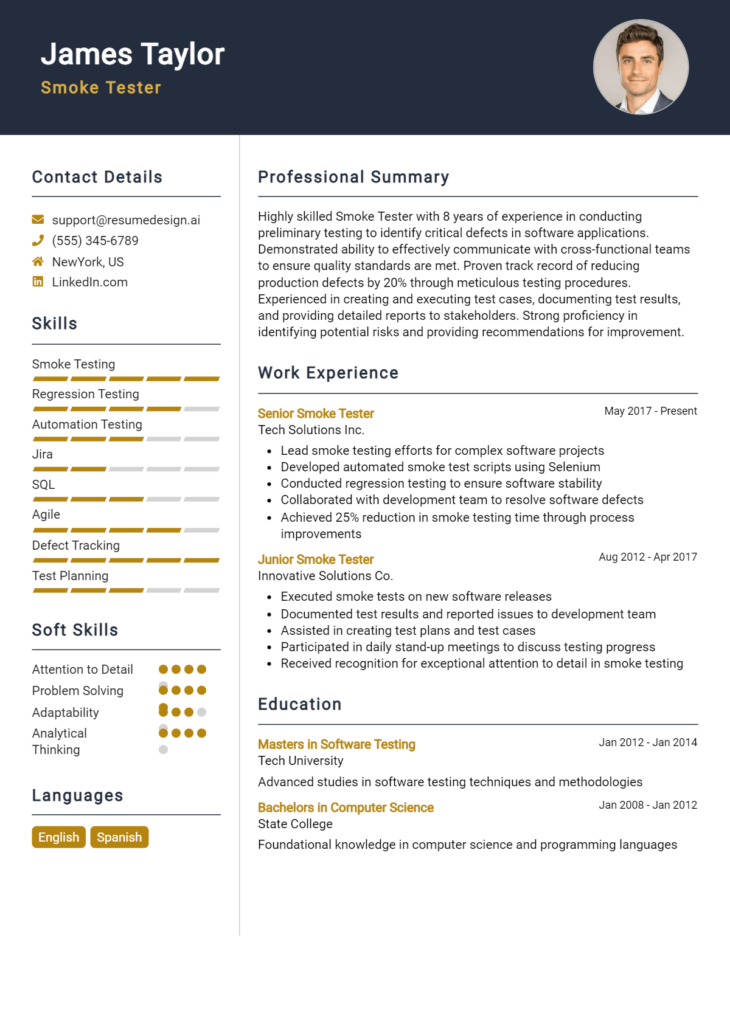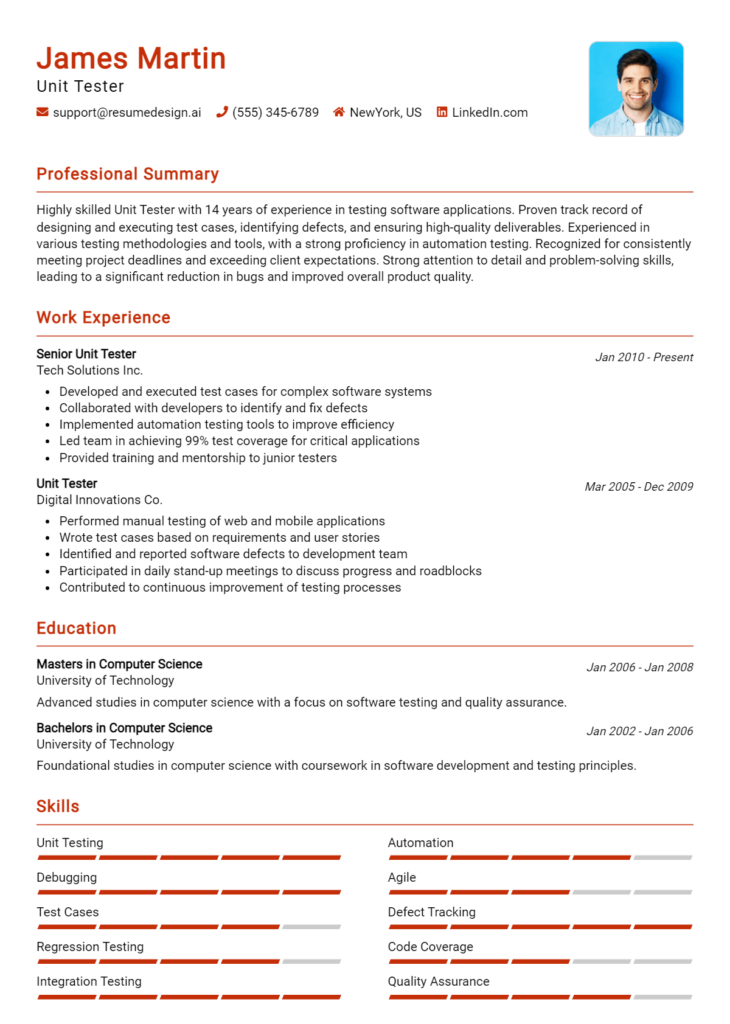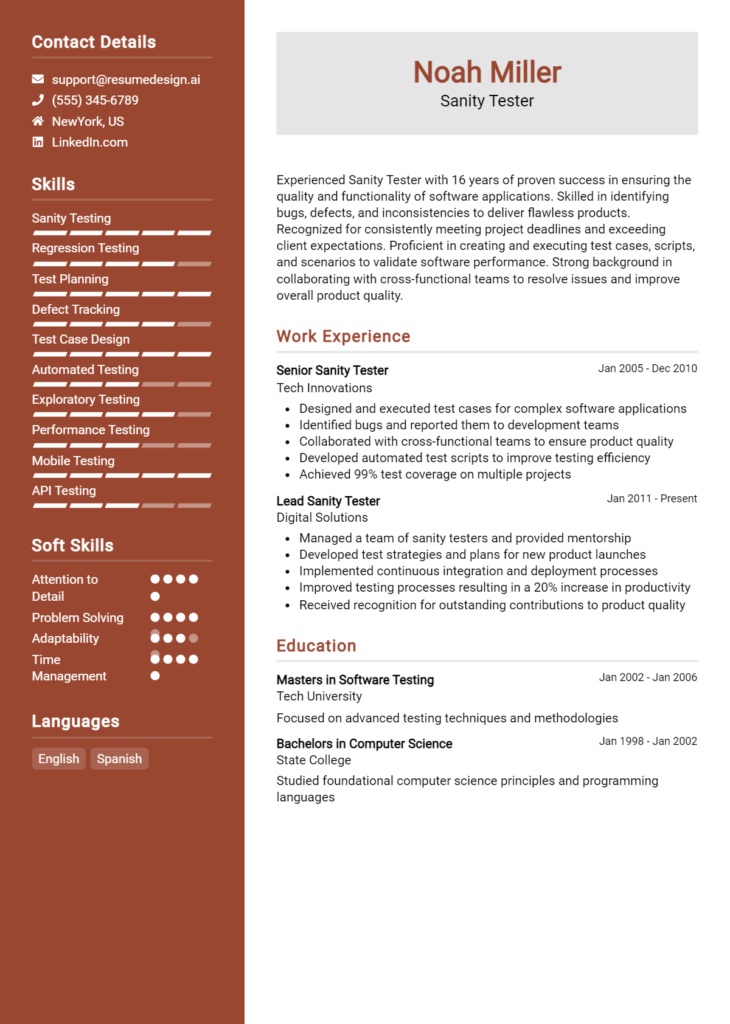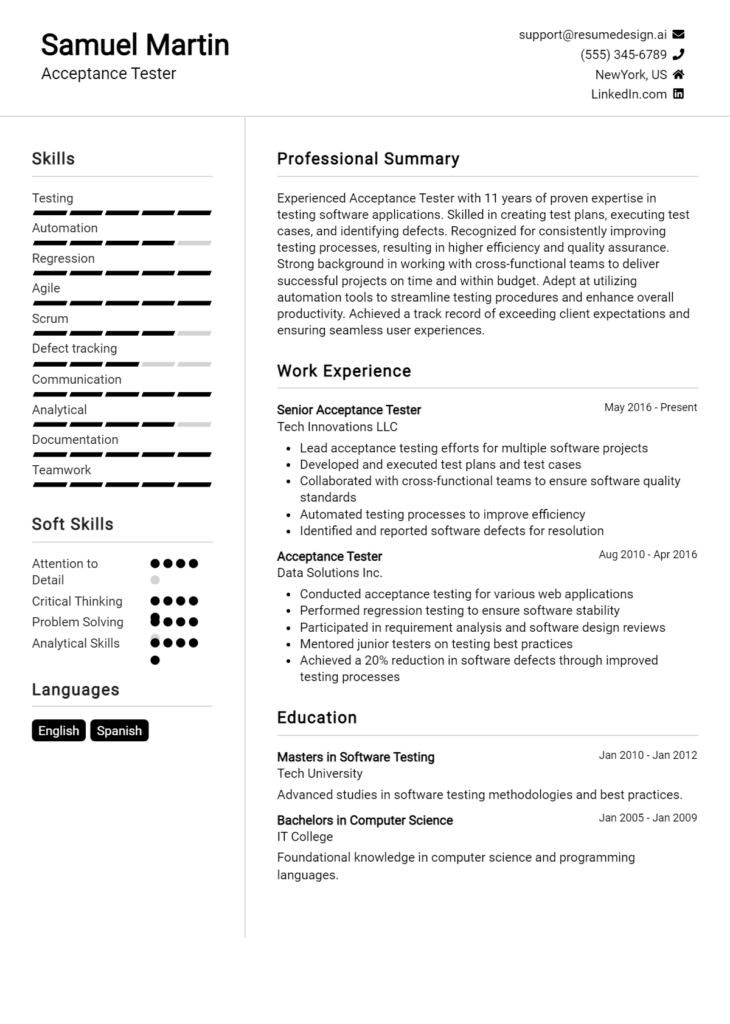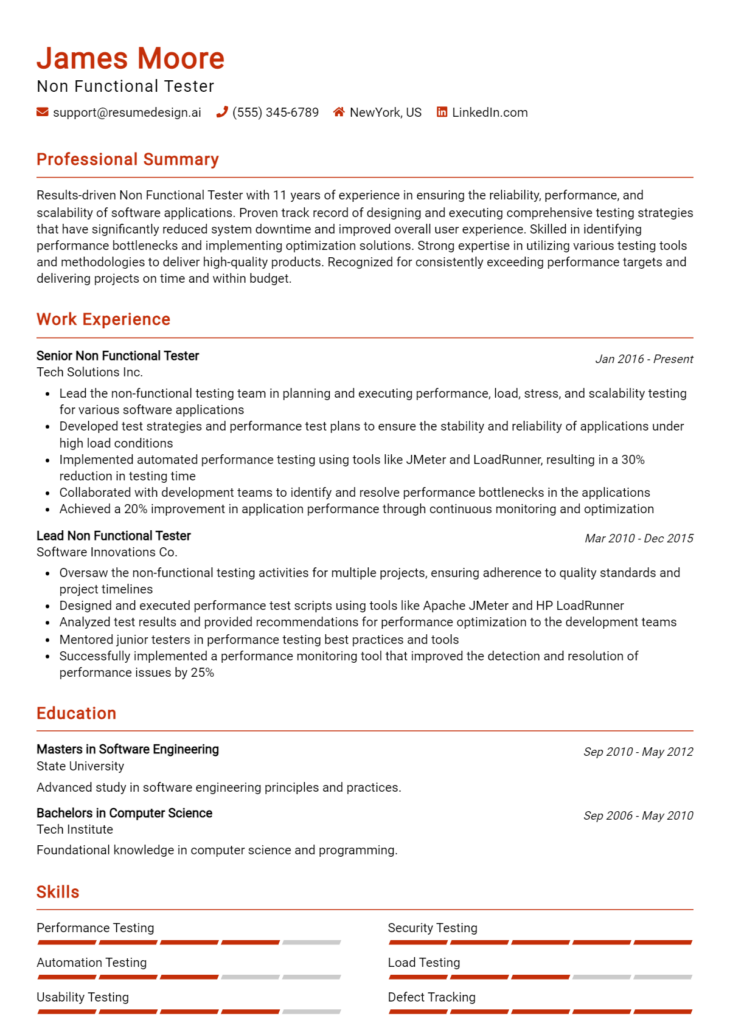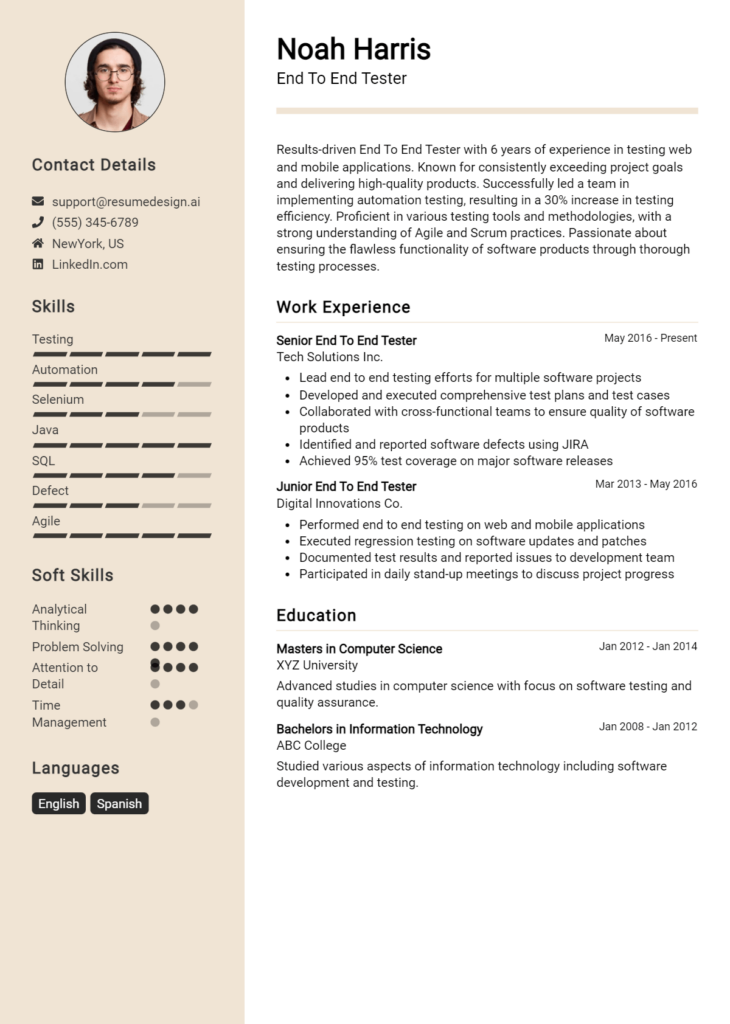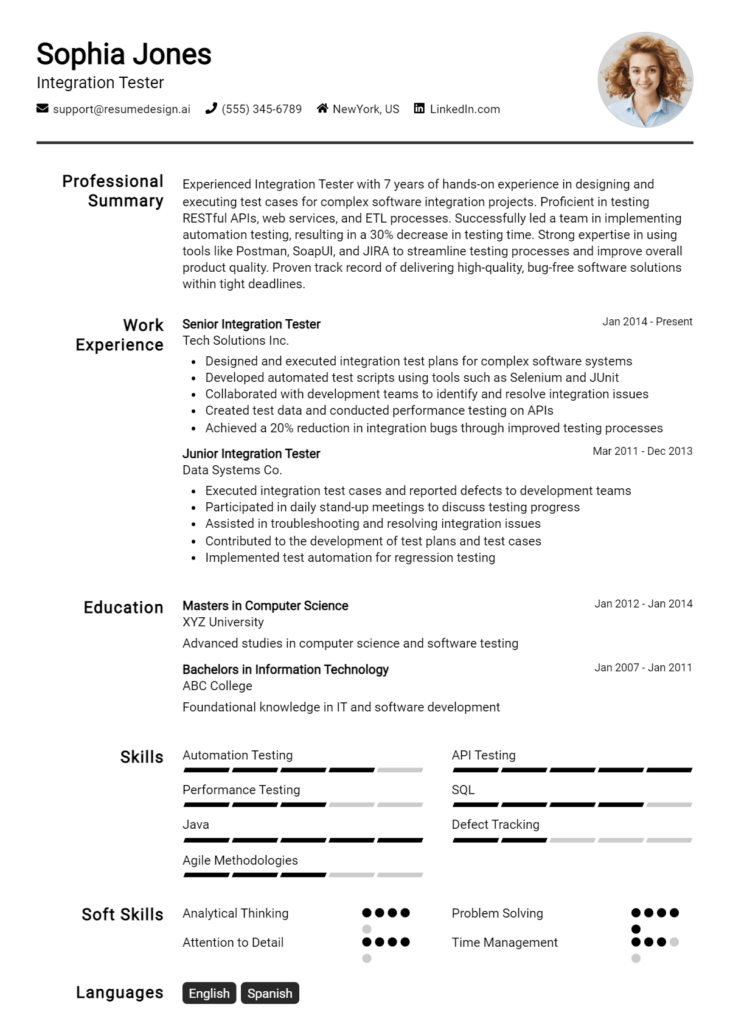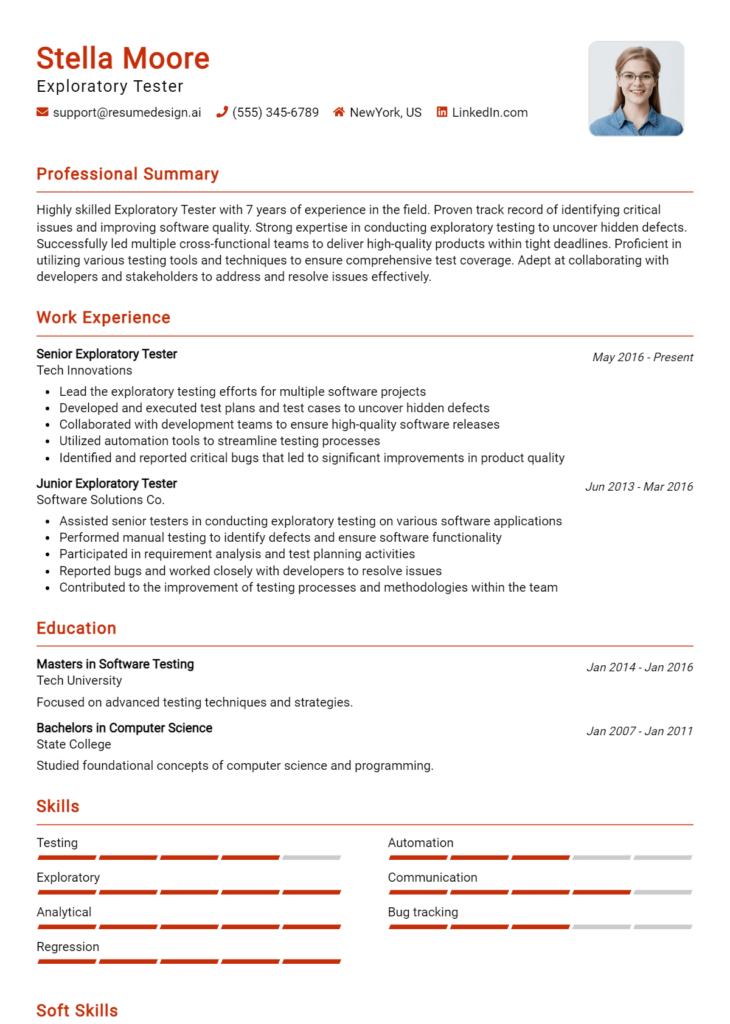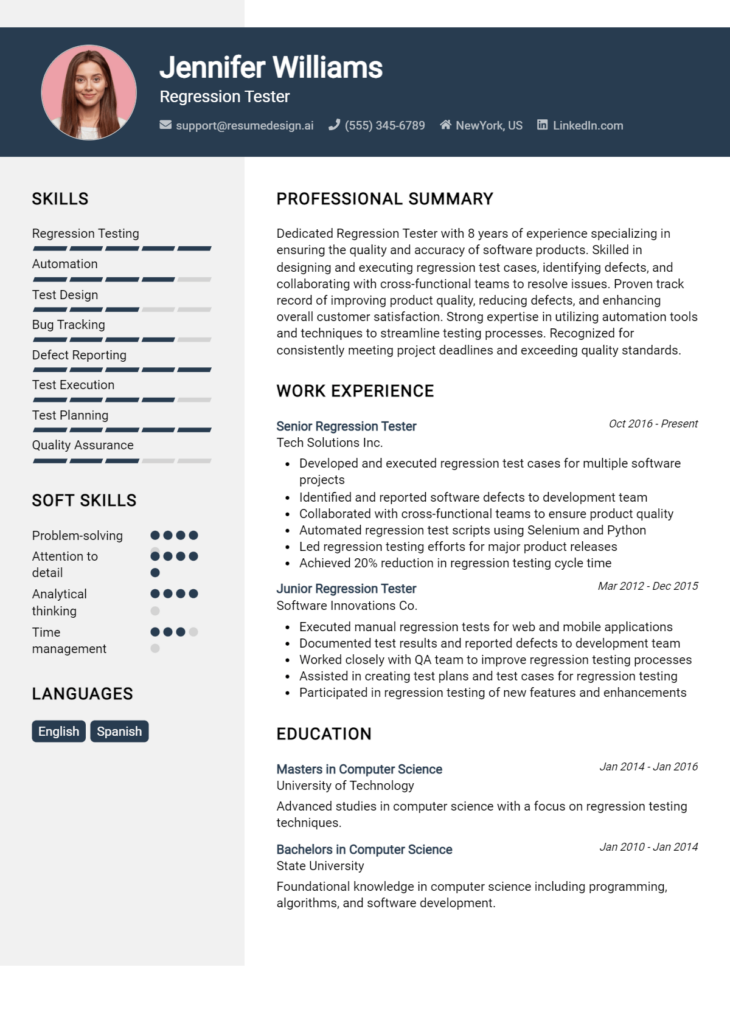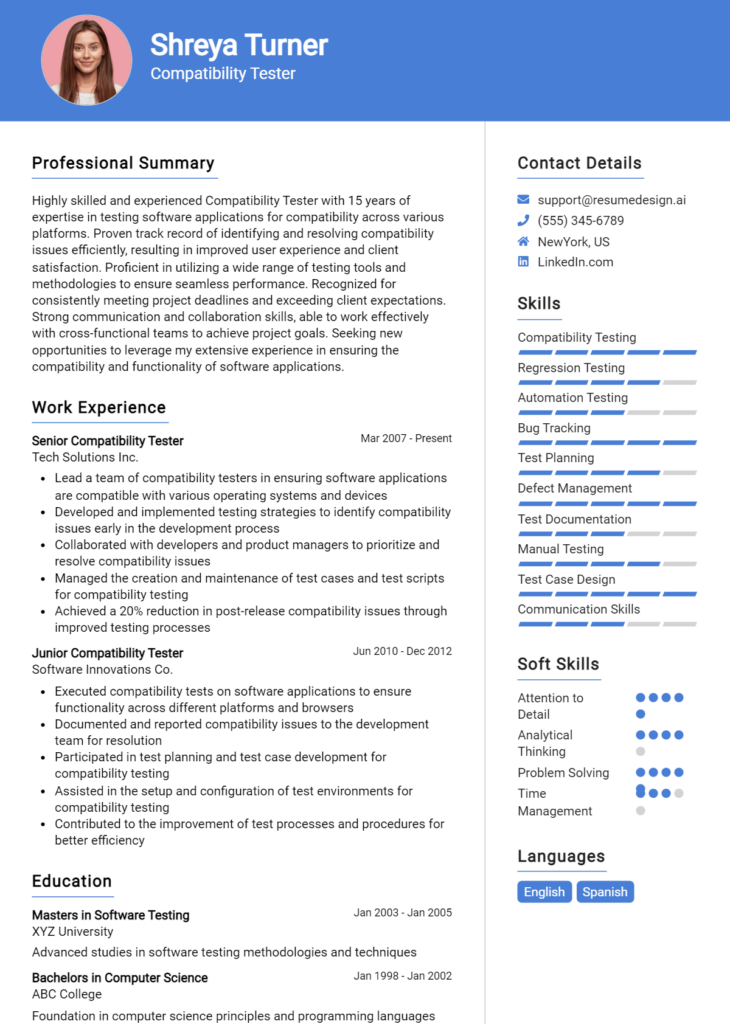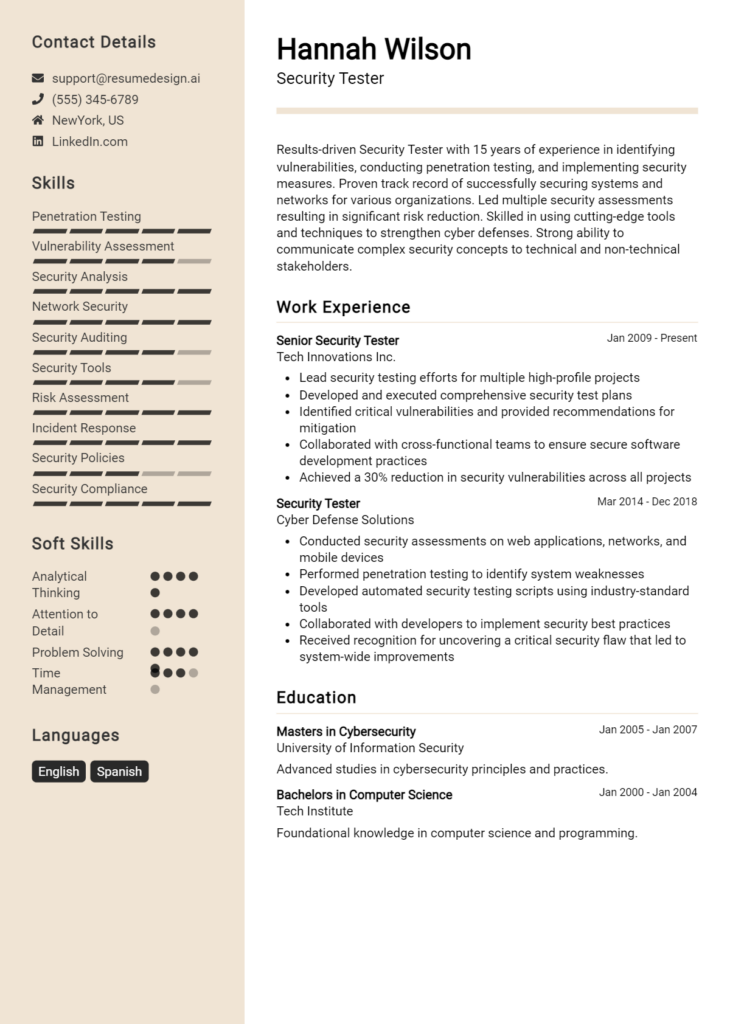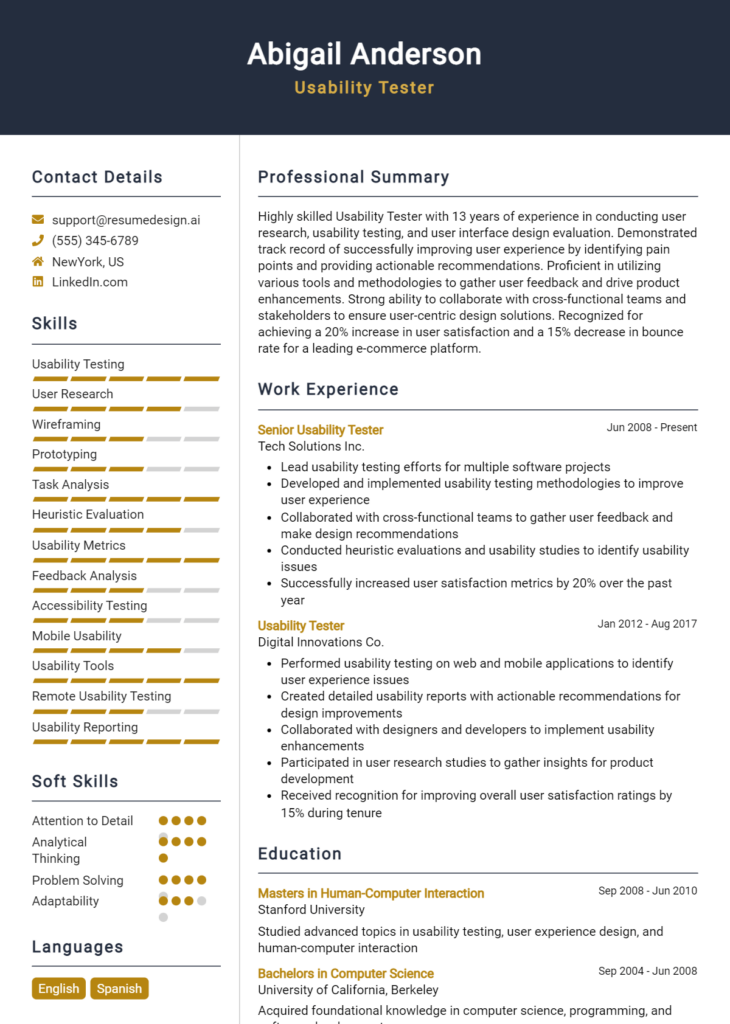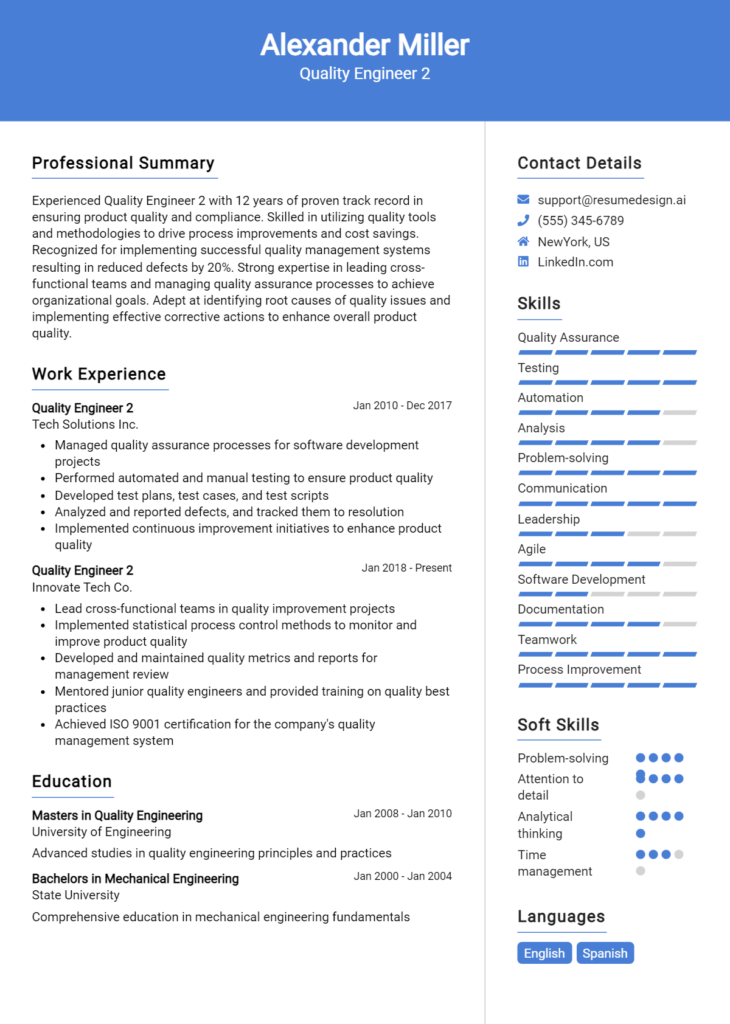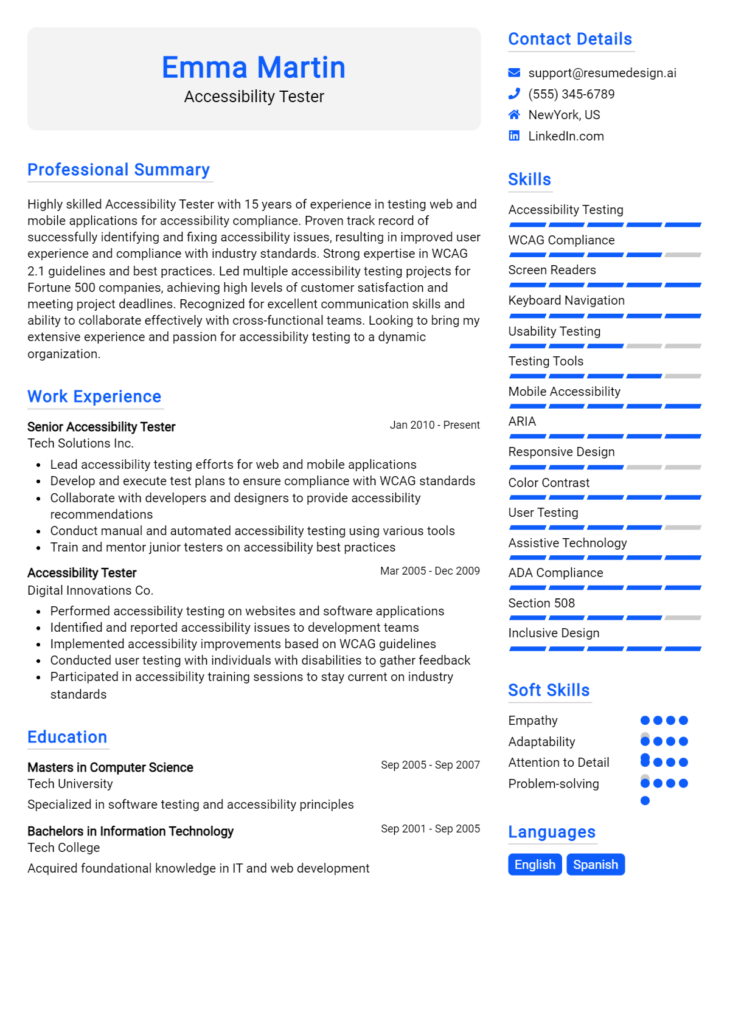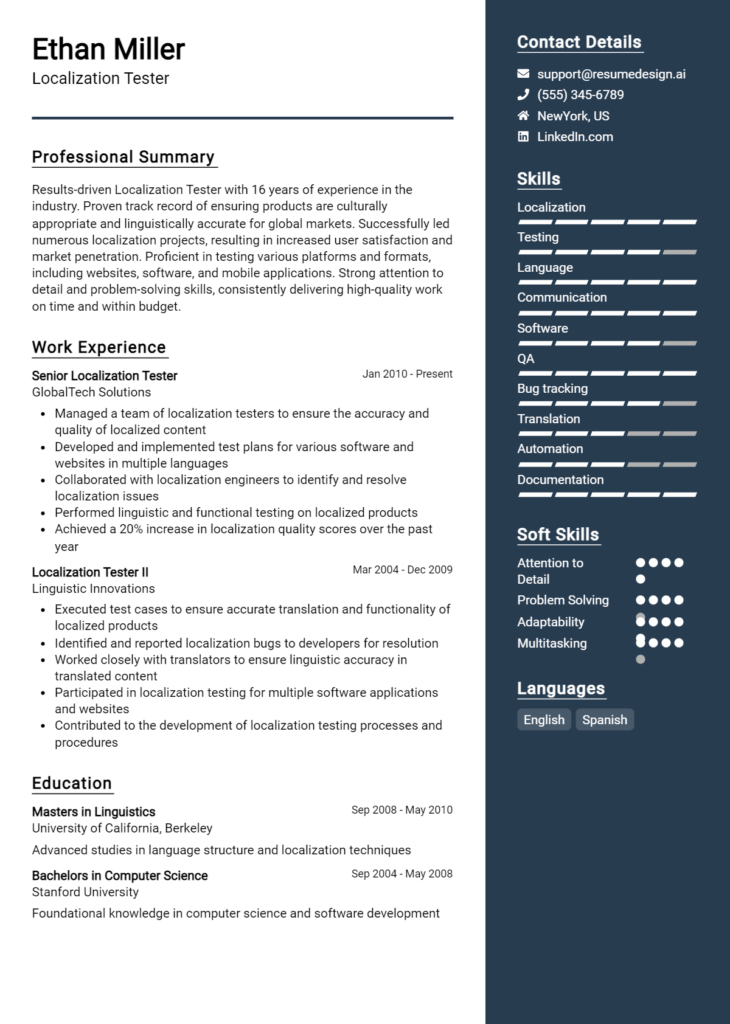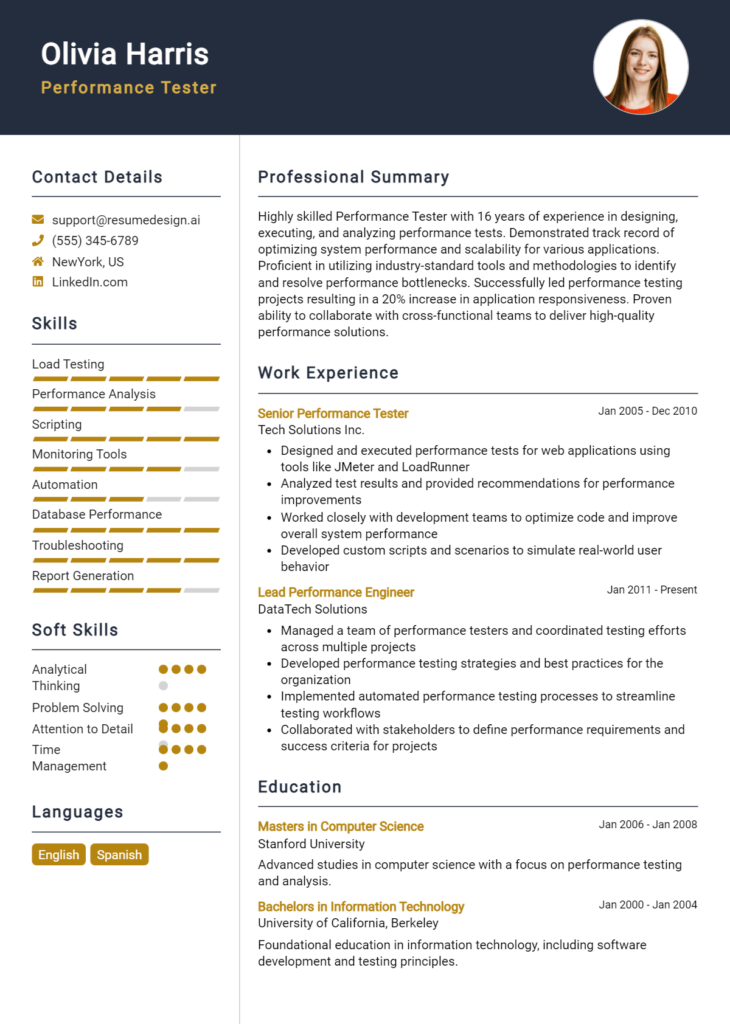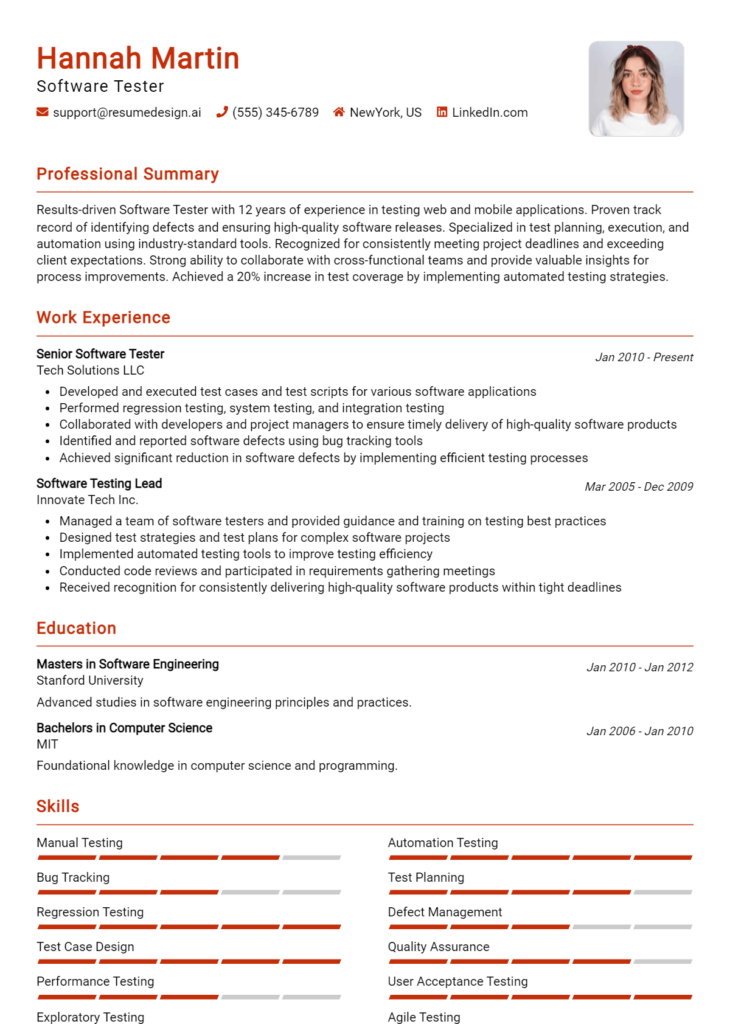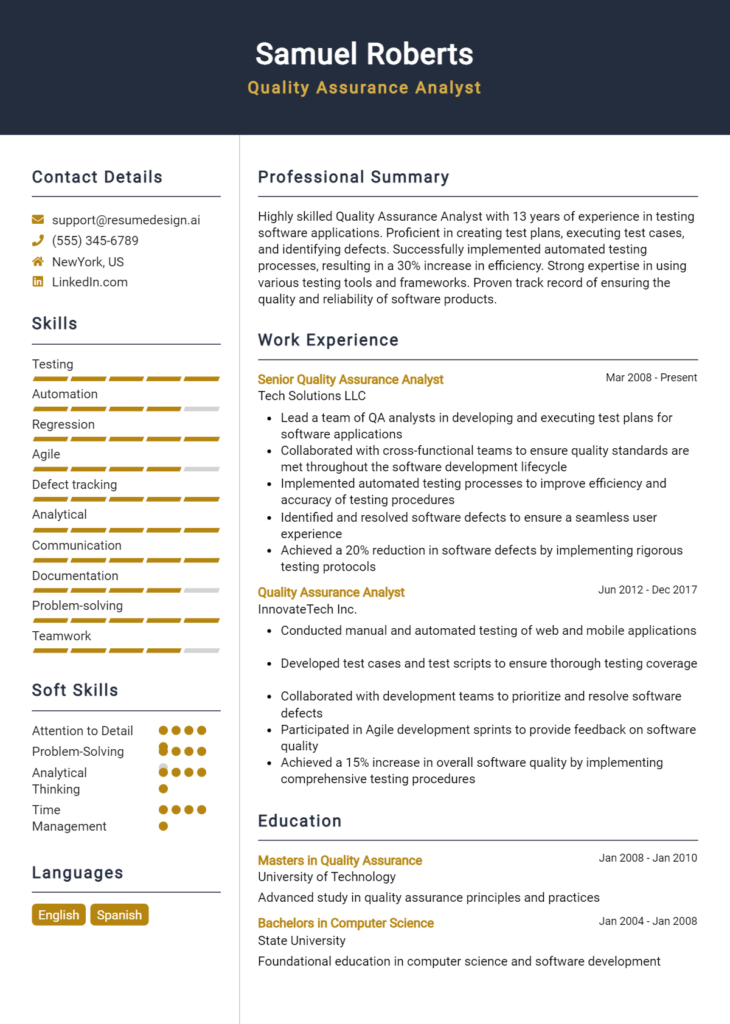Test Automation Engineer Core Responsibilities
A Test Automation Engineer plays a crucial role in ensuring software quality by designing, developing, and executing automated tests. This position requires strong technical skills in programming and testing frameworks, along with operational expertise to integrate automation processes across various departments. Problem-solving abilities are essential to troubleshoot issues and optimize testing efficiency. By effectively showcasing these competencies in a well-structured resume, candidates can demonstrate their alignment with the organization’s goals and their potential to enhance overall productivity.
Common Responsibilities Listed on Test Automation Engineer Resume
- Design and implement automated test scripts to validate software functionality.
- Collaborate with developers and QA teams to identify testing requirements.
- Maintain and enhance existing automated test frameworks.
- Conduct performance and regression testing to ensure software reliability.
- Analyze test results and report defects to the development team.
- Develop test plans and strategies based on project requirements.
- Integrate automated tests into the continuous integration/continuous deployment (CI/CD) pipeline.
- Stay updated with industry trends and emerging testing tools.
- Mentor junior testers in automation best practices.
- Collaborate with cross-functional teams to improve overall software quality.
- Participate in code reviews to ensure testability of new features.
- Document test cases and maintain comprehensive test documentation.
High-Level Resume Tips for Test Automation Engineer Professionals
A well-crafted resume is crucial for Test Automation Engineer professionals, as it often serves as the first impression a candidate makes on potential employers. In a competitive job market, your resume must effectively showcase your skills, experience, and accomplishments tailored to the role. A strong resume not only highlights your technical expertise in test automation but also reflects your problem-solving abilities and contributions to previous projects. This guide will provide practical and actionable resume tips specifically tailored for Test Automation Engineer professionals, ensuring you stand out to hiring managers and secure that coveted interview.
Top Resume Tips for Test Automation Engineer Professionals
- Tailor your resume to the job description by using keywords and phrases that match the specific requirements listed by the employer.
- Highlight your relevant experience in test automation tools and frameworks, such as Selenium, JUnit, or TestNG, ensuring they are prominently featured.
- Quantify your achievements by including metrics that demonstrate the impact of your work, such as reduced testing time or increased test coverage.
- Showcase your coding skills by mentioning programming languages you are proficient in, such as Java, Python, or C#.
- Detail your experience with continuous integration/continuous deployment (CI/CD) pipelines and how you've integrated automated testing into these processes.
- Include relevant certifications, such as ISTQB or Certified Software Tester (CSTE), to validate your expertise and commitment to the field.
- Emphasize your problem-solving and analytical skills by providing examples of challenges you've faced in test automation and how you overcame them.
- Keep your resume concise and focused, ideally limiting it to one or two pages to ensure readability and engagement.
- Use a clean and professional format that enhances the overall presentation of your resume, making it easy for recruiters to navigate.
By implementing these tips, Test Automation Engineer professionals can significantly increase their chances of landing a job in this dynamic field. A well-structured and targeted resume not only captures the attention of hiring managers but also effectively communicates your value as a candidate, paving the way for successful interviews and career advancement.
Why Resume Headlines & Titles are Important for Test Automation Engineer
In the competitive field of software testing, the role of a Test Automation Engineer is crucial in ensuring the efficiency and reliability of applications through automated testing processes. A well-crafted resume headline or title serves as the first impression a candidate makes on hiring managers, encapsulating their key qualifications and professional identity in one impactful phrase. This headline not only captures attention but also sets the tone for the rest of the resume. It should be concise, relevant, and directly aligned with the job being applied for, making it easier for recruiters to quickly assess the candidate’s fit for the role.
Best Practices for Crafting Resume Headlines for Test Automation Engineer
- Keep it concise—ideally one sentence or phrase.
- Make it role-specific; include the title "Test Automation Engineer."
- Highlight key skills or areas of expertise relevant to automation testing.
- Use action-oriented language to convey confidence and capability.
- Incorporate relevant certifications or notable accomplishments.
- Avoid jargon or overly technical terms that may not resonate with all hiring managers.
- Tailor each headline to match the specific job description and requirements.
- Ensure it reflects your professional brand and value proposition.
Example Resume Headlines for Test Automation Engineer
Strong Resume Headlines
"Results-Driven Test Automation Engineer with 5+ Years of Experience in Selenium and Cucumber"
“Certified Test Automation Engineer Specializing in Continuous Integration and Delivery (CI/CD)”
“Expert in Developing Robust Test Automation Frameworks for Scalable Applications”
Weak Resume Headlines
“Engineer Looking for Opportunities”
“Test Automation Specialist”
Strong headlines are effective because they are specific, detail-oriented, and immediately communicate the candidate's value to potential employers, highlighting relevant skills and expertise. In contrast, weak headlines often lack specificity and fail to convey any unique strengths or qualifications, making it difficult for hiring managers to remember or differentiate candidates. By clearly articulating a candidate's experience and focus, strong headlines can significantly enhance a resume's impact.
Writing an Exceptional Test Automation Engineer Resume Summary
A well-crafted resume summary is crucial for a Test Automation Engineer, as it serves as the first impression for hiring managers who often sift through numerous applications. A strong summary succinctly highlights the candidate's key skills, relevant experience, and significant accomplishments, allowing them to stand out in a competitive job market. It should be concise yet impactful, tailored specifically to the job being applied for, ensuring that it immediately captures attention and conveys the candidate's value proposition effectively.
Best Practices for Writing a Test Automation Engineer Resume Summary
- Quantify achievements: Use metrics and specific numbers to illustrate your impact and successes.
- Focus on relevant skills: Highlight technical skills such as programming languages, testing frameworks, and tools that are pertinent to the role.
- Tailor your summary: Customize your summary for each job application to align with the specific requirements and keywords from the job description.
- Keep it concise: Aim for a summary length of 2-4 sentences to maintain the reader's interest.
- Use action verbs: Start sentences with strong action verbs to convey initiative and accomplishment.
- Showcase problem-solving abilities: Emphasize how your skills and experience contributed to overcoming challenges in past roles.
- Highlight certifications or education: If applicable, mention relevant certifications or educational achievements that strengthen your candidacy.
- Maintain a professional tone: Use clear and professional language to convey competence and expertise.
Example Test Automation Engineer Resume Summaries
Strong Resume Summaries
“Results-driven Test Automation Engineer with over 5 years of experience in developing automated test scripts that reduced the testing cycle time by 30%. Proficient in Selenium, Java, and Agile methodologies, with a proven track record of enhancing software quality and efficiency.”
“Detail-oriented Test Automation Engineer skilled in creating robust automated solutions for large-scale applications. Successfully implemented a test automation framework that increased regression testing efficiency by 40%, leading to faster deployment cycles and improved product quality.”
“Innovative Test Automation Engineer with expertise in Python and Cucumber, dedicated to improving testing processes. Spearheaded a project that resulted in a 25% reduction in critical bugs post-release, utilizing effective test strategies and continuous integration tools.”
Weak Resume Summaries
“Test Automation Engineer with experience in testing. Looking for a new opportunity to apply my skills.”
“Dedicated professional with knowledge of testing tools and methodologies. Eager to contribute to team success.”
The strong resume summaries are considered effective because they provide specific achievements, quantify results, and highlight relevant skills that align with the role of a Test Automation Engineer. In contrast, the weak summaries lack detail and substance, failing to convey the candidate's qualifications or the impact of their work, making them less appealing to hiring managers.
Work Experience Section for Test Automation Engineer Resume
The work experience section of a Test Automation Engineer resume is pivotal in demonstrating a candidate's technical skills, leadership capabilities, and commitment to delivering high-quality products. It serves as a platform to showcase not just the roles held but also the impact made within those positions. By quantifying achievements and aligning experiences with industry standards, candidates can effectively communicate their value to potential employers, highlighting their proficiency in automation tools, methodologies, and team collaboration that drives project success.
Best Practices for Test Automation Engineer Work Experience
- Focus on quantifiable achievements, such as the percentage of bugs reduced or improvements in testing efficiency.
- Highlight specific automation tools and frameworks used, such as Selenium, JUnit, or TestNG.
- Include details on team management experience, such as leading a testing team or mentoring junior engineers.
- Demonstrate collaboration with cross-functional teams, including developers, product managers, and QA teams.
- Use action verbs to describe responsibilities and accomplishments, such as "developed," "implemented," or "optimized."
- Align your experiences with industry standards and skills required in job descriptions.
- Keep descriptions concise, focusing on the most relevant and impactful experiences.
- Showcase continuous learning and adaptation to new technologies and methodologies in the automation space.
Example Work Experiences for Test Automation Engineer
Strong Experiences
- Led a team of 5 engineers in developing an automated testing suite that reduced regression testing time by 40%, enhancing overall product delivery speed.
- Implemented a continuous integration pipeline using Jenkins and Selenium, resulting in a 30% increase in test coverage and a 25% decrease in production bugs.
- Collaborated with developers to establish best practices for test-driven development (TDD), leading to a 50% reduction in defect rates over three release cycles.
- Optimized existing test scripts, resulting in a 60% decrease in test execution time and improving efficiency in the QA process.
Weak Experiences
- Worked on automation testing for several projects.
- Participated in team meetings and contributed ideas.
- Helped implement testing processes without specific outcomes.
- Tested applications and reported bugs.
The strong experiences are considered effective because they provide clear, quantifiable results that highlight the candidate's contributions and leadership in test automation. They utilize specific metrics to demonstrate success and collaboration. In contrast, the weak experiences lack detail and measurable impact, making them less compelling to potential employers. They fail to paint a comprehensive picture of the candidate's skills and contributions in a fast-paced testing environment.
Education and Certifications Section for Test Automation Engineer Resume
The education and certifications section of a Test Automation Engineer's resume plays a crucial role in showcasing the candidate's academic foundation and professional development. This section not only highlights the candidate's degrees but also emphasizes industry-relevant certifications and ongoing learning initiatives. By including pertinent coursework, certifications, and specialized training, candidates can significantly enhance their credibility and demonstrate alignment with the job requirements. An effectively structured education and certifications section can set a candidate apart in a competitive job market, illustrating their commitment to mastering the skills necessary for success in test automation.
Best Practices for Test Automation Engineer Education and Certifications
- Focus on relevant degrees such as Computer Science, Software Engineering, or Information Technology.
- List industry-recognized certifications like ISTQB, Selenium Certified Tester, or Certified Agile Tester.
- Include specialized training in automation tools (e.g., Selenium, JUnit, TestNG) or programming languages (e.g., Java, Python).
- Provide details on relevant coursework that showcases skills in software testing, quality assurance, and automation methodologies.
- Keep the section updated with the latest certifications to reflect continuous professional development.
- Highlight honors or distinctions received in educational programs to demonstrate excellence in the field.
- Be specific about the dates of completion for certifications and degrees to show recent and relevant qualifications.
- Avoid listing irrelevant or outdated qualifications that do not pertain to the role of a Test Automation Engineer.
Example Education and Certifications for Test Automation Engineer
Strong Examples
- Bachelor of Science in Computer Science, University of Technology, 2021
- Certified Selenium Tester, International Software Testing Qualifications Board (ISTQB), 2022
- Advanced Automation Techniques Course, Coursera, 2023
- Microsoft Certified: Azure Developer Associate, 2022
Weak Examples
- Bachelor of Arts in History, University of Arts, 2019
- Certification in Basic Computer Skills, Online Learning Academy, 2018
- Diploma in Manual Testing, Local Training Center, 2015
- Outdated ISTQB Foundation Level Certification, 2020
The examples categorized as strong demonstrate direct relevance to the Test Automation Engineer role, showcasing degrees and certifications that enhance the candidate's qualifications in the field of software testing and automation. In contrast, the weak examples reflect outdated or unrelated educational backgrounds and certifications that do not contribute to the candidate's capability as a Test Automation Engineer, potentially undermining their application.
Top Skills & Keywords for Test Automation Engineer Resume
As a Test Automation Engineer, showcasing the right skills on your resume is crucial for standing out in a competitive job market. Employers seek candidates who not only possess technical expertise but also demonstrate strong interpersonal abilities. A well-crafted resume highlights both hard and soft skills, providing a comprehensive view of your qualifications. By emphasizing these skills, you increase your chances of landing interviews and, ultimately, securing a position that matches your career aspirations. For insights on how to effectively list your skills and work experience, it's essential to tailor your resume to reflect the specific requirements of the Test Automation Engineer role.
Top Hard & Soft Skills for Test Automation Engineer
Soft Skills
- Effective Communication
- Team Collaboration
- Problem-Solving
- Adaptability
- Attention to Detail
- Time Management
- Critical Thinking
- Creativity
- Conflict Resolution
- Leadership
Hard Skills
- Proficiency in Automation Tools (e.g., Selenium, QTP)
- Programming Languages (e.g., Java, Python, C#)
- Test Frameworks (e.g., TestNG, JUnit)
- Continuous Integration/Continuous Deployment (CI/CD)
- Version Control Systems (e.g., Git)
- API Testing and Automation
- Performance Testing Tools (e.g., JMeter)
- Knowledge of Agile/Scrum Methodologies
- Database Testing and SQL
- Understanding of Software Development Life Cycle (SDLC)
Stand Out with a Winning Test Automation Engineer Cover Letter
I am writing to express my interest in the Test Automation Engineer position at [Company Name] as advertised on [where you found the job listing]. With a robust background in software development and a passion for quality assurance, I am excited about the opportunity to contribute to your team by enhancing the efficiency and effectiveness of your testing processes. My hands-on experience with automation frameworks and my commitment to delivering high-quality software make me a perfect fit for this role.
In my previous position at [Previous Company Name], I successfully implemented a comprehensive test automation strategy that reduced regression testing time by 50%. This achievement was made possible through my expertise in tools such as Selenium, JUnit, and TestNG. I take pride in writing clean, maintainable code and have developed automated test scripts that not only detect bugs early in the development cycle but also ensure that new features integrate seamlessly with existing functionality. My collaborative spirit has enabled me to work closely with cross-functional teams, effectively bridging the gap between development and quality assurance.
Furthermore, I am continuously seeking to improve my skill set and stay updated with industry trends. I have recently completed a certification in [relevant certification] and have been actively contributing to open-source automation projects. I am particularly drawn to [Company Name] due to its commitment to innovation and excellence in software development. I am eager to bring my technical expertise and a proactive approach to problem-solving to your organization, ensuring that we deliver outstanding products to our clients.
Thank you for considering my application. I look forward to the opportunity to discuss how my skills and experiences align with the needs of your team. I am excited about the possibility of contributing to [Company Name] and helping drive your testing initiatives forward.
Common Mistakes to Avoid in a Test Automation Engineer Resume
When crafting a resume for a Test Automation Engineer position, it's crucial to avoid common pitfalls that can overshadow your skills and experience. A well-structured resume not only highlights your technical abilities but also reflects your understanding of the nuances of the role. Here are some mistakes to steer clear of to ensure your resume stands out to potential employers:
Vague Job Descriptions: Failing to provide specific details about your previous roles can lead to confusion. Instead of stating "worked on automation," specify the tools used and the scope of the projects.
Ignoring Relevant Skills: Many candidates list generic skills that may not align with the job description. Focus on the key automation frameworks, programming languages, and tools that are pertinent to the role you’re applying for.
Lack of Quantifiable Achievements: Resumes that do not include measurable outcomes can appear less impactful. Use metrics to demonstrate how your automation efforts improved efficiency or reduced testing time.
Inconsistent Formatting: A resume with inconsistent fonts, bullet points, or spacing can be distracting. Maintain a clean and professional layout throughout your document to enhance readability.
Overloading Technical Jargon: While technical skills are essential, excessive jargon can alienate hiring managers who may not be as familiar with specific terms. Aim for clarity and conciseness in your explanations.
Neglecting Soft Skills: Test Automation Engineers often work in teams or communicate with stakeholders. Omitting soft skills like communication, collaboration, or problem-solving can weaken your profile.
Not Tailoring the Resume: Submitting a generic resume for multiple positions can lead to missed opportunities. Tailor your resume to reflect the requirements and preferences listed in each job description.
Failing to Highlight Continuous Learning: The tech industry is constantly evolving, and failing to mention ongoing education, certifications, or involvement in relevant communities can make you seem out of touch. Show your commitment to staying current in the field.
Conclusion
In this article, we have explored the essential skills, responsibilities, and best practices for a Test Automation Engineer. We discussed the importance of programming languages, testing frameworks, and effective collaboration with development teams to ensure high-quality software delivery. Additionally, we highlighted the significance of continuous learning and staying updated with emerging technologies in the field of automation testing.
As you reflect on your career as a Test Automation Engineer, it's crucial to ensure that your resume effectively showcases your skills and achievements. Take this opportunity to review and enhance your resume. Consider utilizing resources like resume templates, which can help you format your information attractively. You might also find it beneficial to use a resume builder for a streamlined creation process or to browse through resume examples that can inspire your own document. Don’t forget about the importance of a well-crafted cover letter; check out cover letter templates to make a strong first impression.
Take action now and refine your resume to stand out in the competitive job market. The right tools and resources are at your fingertips!

